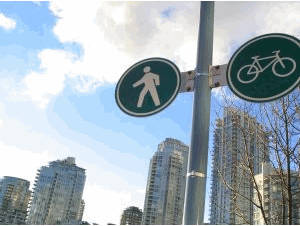Tax Carbon, Not Income
by Brandon Fuller Charles Wheelan--Yahoo! Finance columnist, author of Naked Economics: Undressing the Dismal Science, and public policy lecturer at Chicago's Harris School--has a knack for user-friendly explanations of economic ideas.
Charles Wheelan--Yahoo! Finance columnist, author of Naked Economics: Undressing the Dismal Science, and public policy lecturer at Chicago's Harris School--has a knack for user-friendly explanations of economic ideas.The Naked Economist has a modest policy proposal for Presidential hopefuls, Democrat or Republican: Tax carbon, not income. Wheelan proposes a revenue neutral tax policy: Increase taxes on carbon-based energy, like gas and coal, reduce income and payroll taxes, and engineer the changes in such a way that government tax revenues remain the same. Americans might balk at paying even higher prices at the pump, but under Wheelan's proposal they'd write smaller checks to the IRS. Wheelan makes the case for revenue neutral energy tax reform in his latest Yahoo! Finance column.
1. How would the carbon tax change our behavior--the cars and appliances we buy, our driving habits, the way and extent to which we heat or cool our homes? According to Wheelan, what are some environmental and geo-political benefits of the carbon tax? How do payroll and income tax cuts affect our incentive to work?
2. Negative externalities occur when we do stuff that's bad for other people without compensating them for the inconvenience. To what extent would a carbon tax reduce negative externalities associated with fossil fuel consumption?
3. A tax is regressive when the share of your income devoted to the tax declines as your income rises. Since lower-income households tend to spend a greater share of their income on energy than higher-income households, the carbon tax would be regressive. How could policymakers reduce the regressive impact of the carbon tax when cutting income and payroll tax rates?
4. How would our long-term response to carbon taxes present problems for the revenue neutrality of Wheelan's proposal? (In econ jargon: how does the price elasticity of demand for carbon- based energy change as time passes?)
Labels: Environment, Externalities, Taxes



1 Comments:
At 2:34 PM, November 21, 2006, Anonymous
said…
Anonymous
said…
The Liberal Democrat party in the UK have begun to put forward a very similar scheme.
They claim that the realignment of tax boundaries will relieve 2 million working class families of any income tax burden whatsoever.
Seems to me to be a logical solution to a number of issues. However, the fact that government revenue will fall as carbon emissions decline is an undeniable if solvable sticking point.
Post a Comment
<< Home